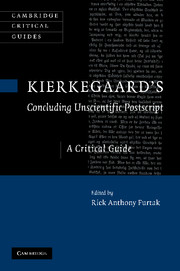Book contents
- Frontmatter
- Contents
- List of contributors
- Acknowledgments
- List of abbreviations
- Introduction
- 1 The “Socratic secret”: the postscript to the Philosophical Crumbs
- 2 Kierkegaard's Socratic pseudonym: A profile of Johannes Climacus
- 3 Johannes Climacus' revocation
- 4 From the garden of the dead: Climacus on interpersonal inwardness
- 5 The Kierkegaardian ideal of “essential knowing” and the scandal of modern philosophy
- 6 Lessing and Socrates in Kierkegaard's Postscript
- 7 Climacus on subjectivity and the system
- 8 Humor and irony in the Postscript
- 9 Climacus on the task of becoming a Christian
- 10 The epistemology of the Postscript
- 11 Faith and reason in Kierkegaard's Concluding Unscientific Postscript
- 12 Making Christianity difficult: The “existentialist theology” of Kierkegaard's Postscript
- Bibliography
- Index
- References
11 - Faith and reason in Kierkegaard's Concluding Unscientific Postscript
Published online by Cambridge University Press: 04 August 2010
- Frontmatter
- Contents
- List of contributors
- Acknowledgments
- List of abbreviations
- Introduction
- 1 The “Socratic secret”: the postscript to the Philosophical Crumbs
- 2 Kierkegaard's Socratic pseudonym: A profile of Johannes Climacus
- 3 Johannes Climacus' revocation
- 4 From the garden of the dead: Climacus on interpersonal inwardness
- 5 The Kierkegaardian ideal of “essential knowing” and the scandal of modern philosophy
- 6 Lessing and Socrates in Kierkegaard's Postscript
- 7 Climacus on subjectivity and the system
- 8 Humor and irony in the Postscript
- 9 Climacus on the task of becoming a Christian
- 10 The epistemology of the Postscript
- 11 Faith and reason in Kierkegaard's Concluding Unscientific Postscript
- 12 Making Christianity difficult: The “existentialist theology” of Kierkegaard's Postscript
- Bibliography
- Index
- References
Summary
Kierkegaard's views on the relationship of faith to reason are usually counted among the most important and distinctive contributions of his thought. Since Concluding Unscientific Postscript (hereafter Postscript) is often regarded as one of his most significant philosophical works, it certainly makes sense to give careful attention to how faith and reason are viewed in this book. Surprisingly, however, although there is much in this work about reason and much about faith, there is actually very little attention paid to their relationship. The major discussion is found in only one section of Postscript, which appears late in the chapter on “The Problem of the Crumbs,” under the heading “The Dialectical Aspect” (CUP 470–488). The relative brevity of this section is perhaps to be explained by the fact that Johannes Climacus, the pseudonymous author, has already given decisive attention to these issues in his earlier Philosophical Crumbs, and in this section of Postscript he frequently refers back to that previous work. Though the full title of Postscript is rarely used in citations of the book, it is worth recalling that the book is a kind of sequel, Concluding Unscientific Postscript to the Philosophical Crumbs. Hence, in looking at Postscript, I shall also refer back to Crumbs at many points.
Although the relevant section of Postscript is relatively brief, given the massive size of the book, it is nevertheless replete with interpretive problems. The major issue I wish to address concerns the stance of faith toward reason.
Keywords
- Type
- Chapter
- Information
- Kierkegaard's 'Concluding Unscientific Postscript'A Critical Guide, pp. 204 - 218Publisher: Cambridge University PressPrint publication year: 2010

